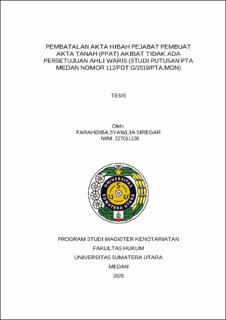| dc.contributor.advisor | Purba, Hasim | |
| dc.contributor.advisor | Leviza, Jelly | |
| dc.contributor.author | Siregar, Farahdiba Syawlia | |
| dc.date.accessioned | 2025-04-17T03:19:27Z | |
| dc.date.available | 2025-04-17T03:19:27Z | |
| dc.date.issued | 2025 | |
| dc.identifier.uri | https://repositori.usu.ac.id/handle/123456789/103232 | |
| dc.description.abstract | A gift is something which is given for free; it is intended to be the solution in distributing inheritance so that there will be no conflict in practicing it. In reality, however, a gift is not the best solution because there are many disputes about the revocation of deed of gift as what happens in the Verdict of the Medan PTA (High Religious Court) No. 112/Pdt.G/2019/PTA.Mdn because a gift is a joint property and given by the parents to one of their children without any approval from the other heirs. The result is that it causes a conflict among the heirs since they think that it is not fair.
This research uses juridical normative research method with descriptive analytic approach. The data consists of secondary data, obtained from primary, secondary, and tertiary legal materials. They are gathered by conducting library research and interviews. The gathered data are analyzed by using qualitative analytical method.
The result of the research suggests that the revocation of the deed of gift happens because there is a regulation which has been violated - the gift is more than 1/3 of the property. In making the deed of gift, a PPAT is responsible for it. He is required to understand the regulations on distribution of a gift, let alone if the heirs and the testators are Moslems. He has to know how to distribute a gift in the KHI (Compilation of the Islamic Laws), and he has to apply the Principle of Prudence in making Deeds of Gift in order to avoid conflicts.
The conclusion is that the Deed of Gift No. 184/Binjai Kota/2004 issued by PPAT in the Verdict of Medan PTA No. 112/Pdt.G/2019/PTA.Mdn does not have any legal force because the deed of gift has violated the Islamic Sharia specified in Article 210 of KHI in which it is more than 1/3 of the testator's property and the distribution of inheritance does not have any approval from the heirs. The consequence is that the receiver loses his right on the gift. The panel of judges' decision causes the status of the land and the building becomes the joint property again. The panel of judges' decision in this Verdict has applied the Principle of Prudence for the whole party since the judges do not side with any parties in the litigation, and they recognize the equality of rights and obligations of both parties.
Keywords: revocation, deed of gift, approval | en_US |
| dc.language.iso | id | en_US |
| dc.publisher | Universitas Sumatera Utara | en_US |
| dc.subject | revocation | en_US |
| dc.subject | deed of gift | en_US |
| dc.subject | approval | en_US |
| dc.title | Pembatalan Akta Hibah Pejabat Pembuat Akta Tanah (PPAT) Akibat Tidak Ada Persetujuan Ahli Waris (Studi Putusan PTA Medan Nomor 112/Pdt.G/2019/PTA.Mdn) | en_US |
| dc.title.alternative | Revocation of Deed of Gift Issued by a PPAT Due To Heir's Disapproval (A Study on the Verdict of Medan High Religious Court No. 112/Pdt.G/2019/PTA.Mdn) | en_US |
| dc.type | Thesis | en_US |
| dc.identifier.nim | NIM227011136 | |
| dc.identifier.nidn | NIDN0003036602 | |
| dc.identifier.nidn | NIDN0001087301 | |
| dc.identifier.kodeprodi | KODEPRODI74102#Kenotariatan | |
| dc.description.pages | 171 Pages | en_US |
| dc.description.type | Tesis Magister | en_US |
| dc.subject.sdgs | SDGs 16. Peace, Justice And Strong Institutions | en_US |


